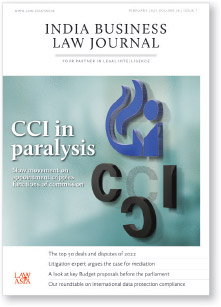Competition regulator struggles amid M&A boom
For India, 2022 continued to be a great year for M&A, with deal values soaring to USD119 billion as per data from Refinitiv – a 156% increase compared to 2021.
Companies that are household names such as HDFC, Adani Group, Bharti Airtel and L&T Infotech were all involved in some form of M&A. This is in contrast to most of the world, where M&A ran out of steam in mid-2022. The country has been an attractive destination for M&A deals in the e-commerce, technology, healthcare and startup sectors.

India Business Law Journal
But while M&A in India was flourishing, the regulatory front approvals witnessed a marked slowdown. For approvals, the Competition Commission of India (CCI) mandates a quorum of three members. However, since the retirement of former chairperson Ashok Kumar Gupta on 25 October 2022, there have been just two, which has put the commission’s work in limbo.
Our Cover story, looks at how the CCI is almost helpless to cater to rising needs stemming from this critical shortage. Problems for India’s antitrust watchdog have increased even though a workaround measure, in the form of the doctrine of necessity, has been applied. While the interim directives allow for approvals for mergers without a quorum, the lack of speedier appointments begs a critical question – was the government’s decision to downsize the commission as part of its “minimum government” mantra the right decision?
The article also looks at other countries that faced similar issues, and how they were able to get back on track. But while decision-making has come to a standstill, the CCI’s investigation arm is working and busy sending out notices. If there is a silver lining for the CCI, it’s that there has been slowdown in M&A activity since the start of 2023, which has lessened the workload.
In Deals of the Year 2022, we look at the pathbreaking deals and disputes that were the highlights of the previous year. India saw two records broken. HDFC Bank’s USD40 billion merger with its parent company made it the largest M&A transaction in India to date, and Life Insurance Corporation’s USD2.7 billion IPO the largest IPO to date.
India’s media and entertainment behemoths Sony Pictures Networks India and Zee Entertainment Enterprises also opted for a merger, which will result in the formation of a USD10 billion company. The deal faced approval challenges at the CCI because the regulator felt that the merger was “likely to result in an appreciable adverse effect in competition”.
In this month’s Spotlight, tax-focused law firm Lakshmikumaran & Sridharan dissects the annual budget and key proposals presented to the parliament. Among them, personal tax has received an impetus, with those on an annual income of up to USD9,000 exempt from tax, compared to the previous threshold of USD6,100.
The changes to the taxation regime for micro, small and medium-sized enterprises bring some relief to an otherwise neglected source of revenue. And from the new financial year, startups incorporated on or before 1 April 2024 will be incentivised with an income tax exemption for three consecutive years.
Our Intelligence Report reveals insights from a virtual roundtable discussion held jointly by Ikigai Law and India Business Law Journal. Sreenidhi Srinivasan, partner and lead lawyer on data at Ikigai Law, moderated the discussion with eminent counsel from different parts of Asia.
India’s data protection law has remained elusive for a long time, but the bill is expected to be introduced in parliament during the ongoing Budget session. In this discussion, the panellists discussed viable options for in-house counsel at companies with an international presence as they witness country after country setting up their own versions of data privacy laws.
The panellists discussed whether the EU’s General Data Protection Regulation should be considered the gold standard for data laws, and whether certain baselines could be established for companies to be internationally data compliant. They also zoomed in on the finer nuances of global data privacy compliance, different national obligations, trends to glean from regulatory enforcement actions, and data mapping.
In Mediation by necessity, Max Life Insurance’s head of litigation, Amit Wadhwa, and the company’s legal manager, Richa Relhan, observe that mediation has emerged to become the preferred means for alternate dispute resolution, in commercial parlance better known as BATNA (best alternative to a negotiated agreement).
The article presents mediation as an alternative to litigation, and covers subjects such as mandatory mediation and online dispute resolution. The authors provide a caveat that the systems of the alternate dispute resolution can only function to their full potential when practitioners are well-equipped and work within a well-regulated framework.


























